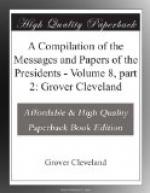The condition of the various branches of the public service resorting from the Department of War, and their administration during the current year, will be exhibited in the report of the Secretary of War and the accompanying documents herewith communicated. The organization and discipline of the Army are effective and satisfactory. To counteract the prevalence of desertion among the troops it has been suggested to withhold from the men a small portion of their monthly pay until the period of their discharge; and some expedient appears to be necessary to preserve and maintain among the officers so much of the art of horsemanship as could scarcely fail to be found wanting on the possible sudden eruption of a war, which should take us unprovided with a single corps of cavalry. The Military Academy at West Point, under the restrictions of a severe but paternal superintendence, recommends itself more and more to the patronage of the nation, and the numbers of meritorious officers which it forms and introduces to the public service furnishes the means of multiplying the undertakings of public improvements to which their acquirements at that institution are peculiarly adapted. The school of artillery practice established at Fortress Monroe is well suited to the same purpose, and may heed the aid of further legislative provision to the same end. The reports of the various officers at the head of the administrative branches of the military service, connected with the quartering, clothing, subsistence, health, and pay of the Army, exhibit the assiduous vigilance of those officers in the performance of their respective duties, and the faithful accountability which has pervaded every part of the system.
Our relations with the numerous tribes of aboriginal natives of this country, scattered over its extensive surface and so dependent even for their existence upon our power, have been during the present year highly interesting. An act of Congress of 25th of May, 1824, made an appropriation to defray the expenses of making treaties of trade and friendship with the Indian tribes beyond the Mississippi. An act of 3d of March, 1825, authorized treaties to be made with the Indians for their consent to the making of a road from the frontier of Missouri to that of New Mexico, and another act of the same date provided for defraying the expenses of holding treaties with the Sioux, Chippeways, Menomenees, Sauks, Foxes, etc., for the purpose of establishing boundaries and promoting peace between said tribes. The first and the last objects of these acts have been accomplished, and the second is yet in a process of execution. The treaties which since the last session of Congress have been concluded with the several tribes will be laid before the Senate for their consideration conformably to the Constitution. They comprise large and valuable acquisitions of territory, and they secure an adjustment of boundaries and give pledges of permanent peace between several tribes which had been long waging bloody wars against each other.




